Unit 2 Great people. Grammar.课件(共34张PPT)
文档属性
| 名称 | Unit 2 Great people. Grammar.课件(共34张PPT) |

|
|
| 格式 | zip | ||
| 文件大小 | 1.2MB | ||
| 资源类型 | 教案 | ||
| 版本资源 | 牛津译林版 | ||
| 科目 | 英语 | ||
| 更新时间 | 2016-03-02 00:00:00 | ||
图片预览

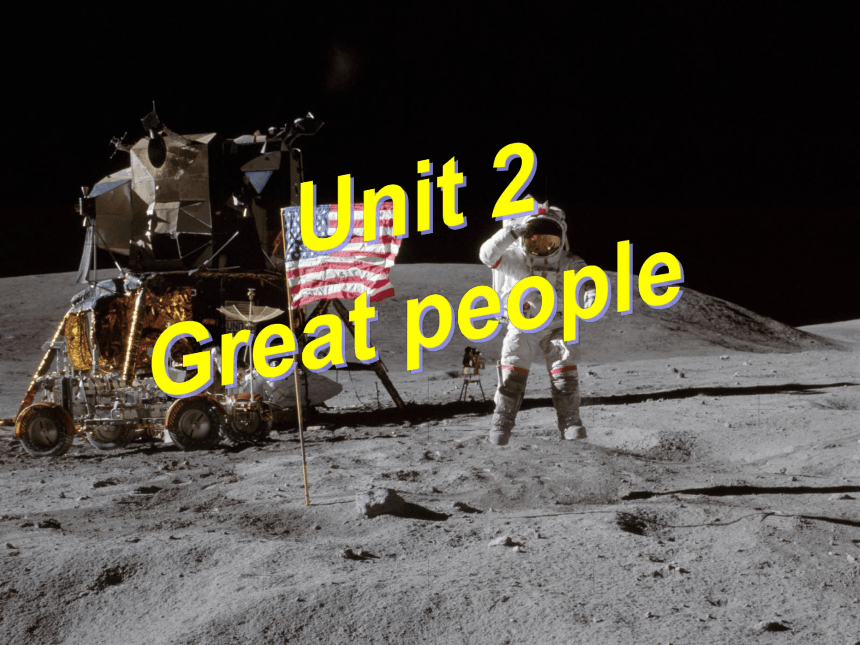
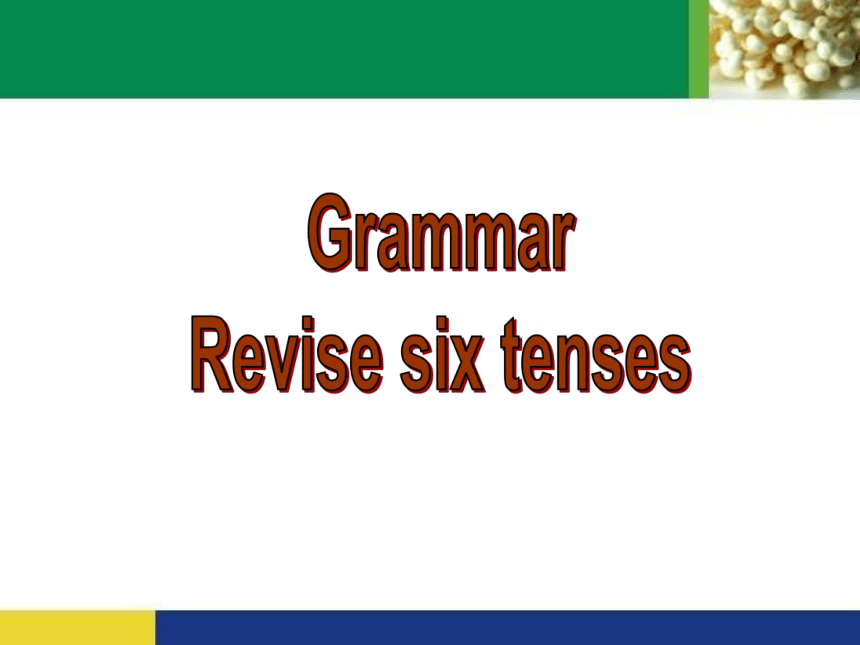
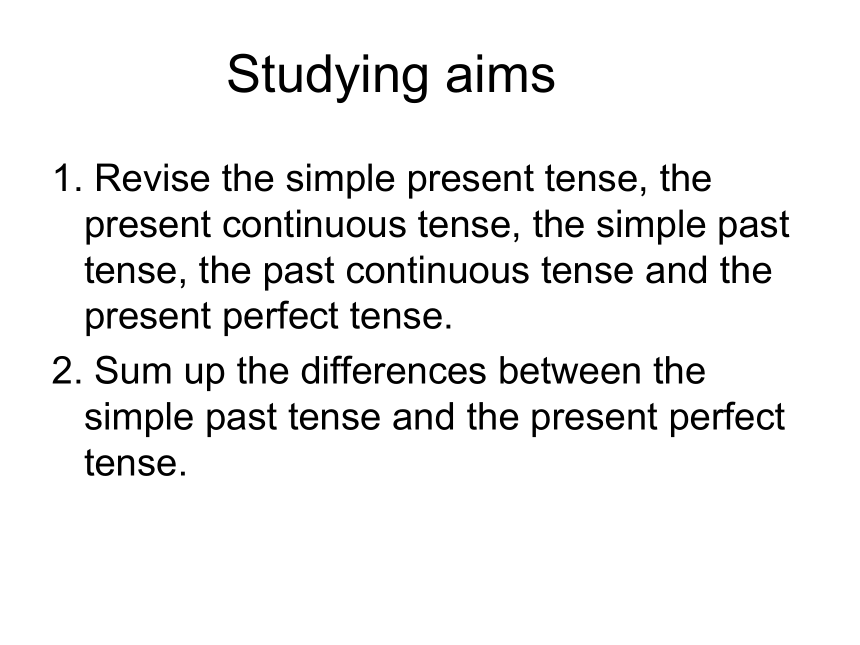
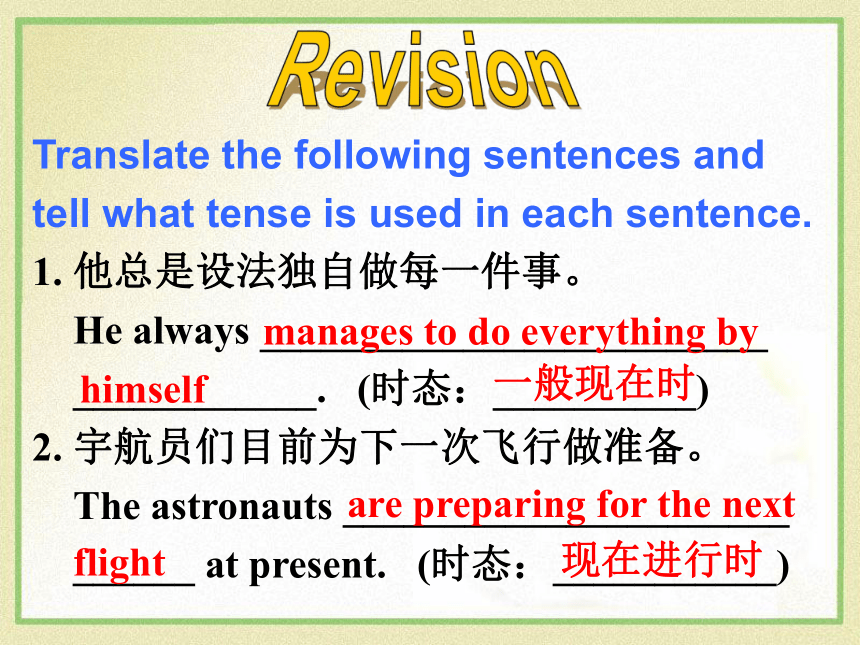
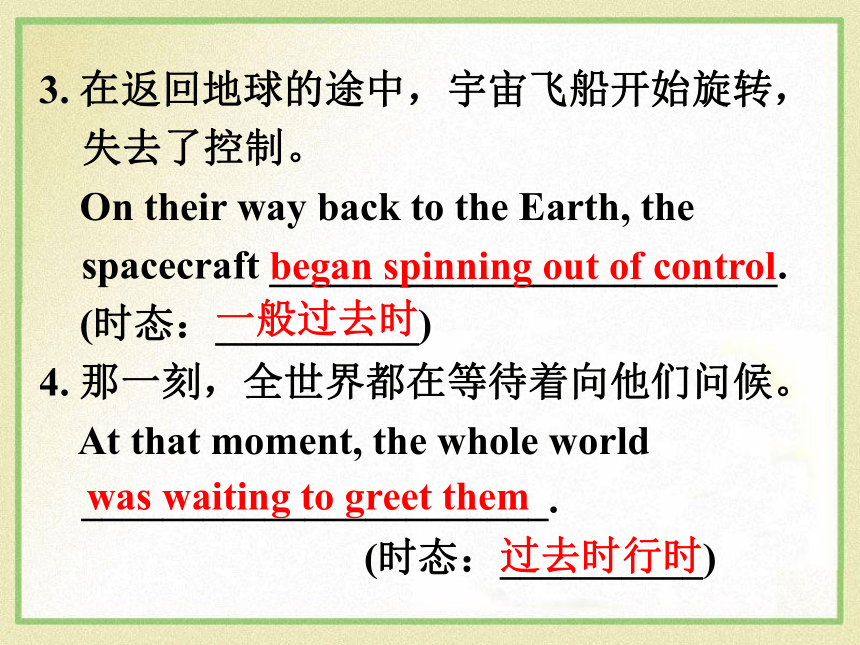
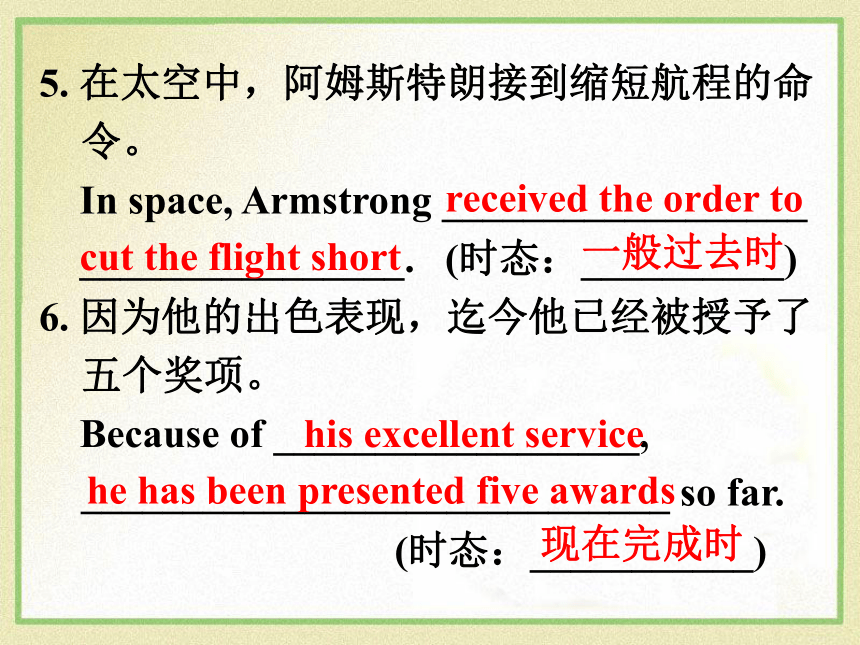
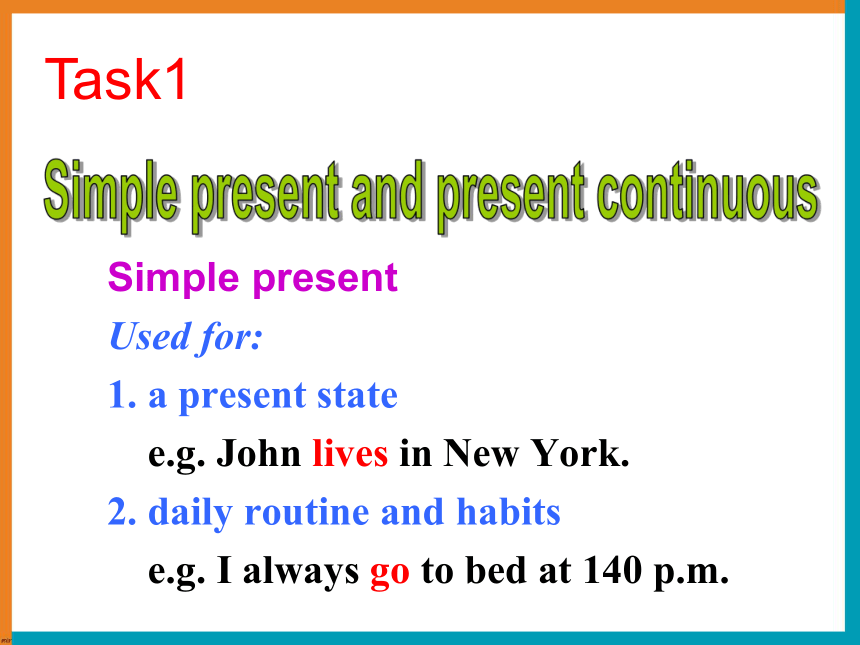
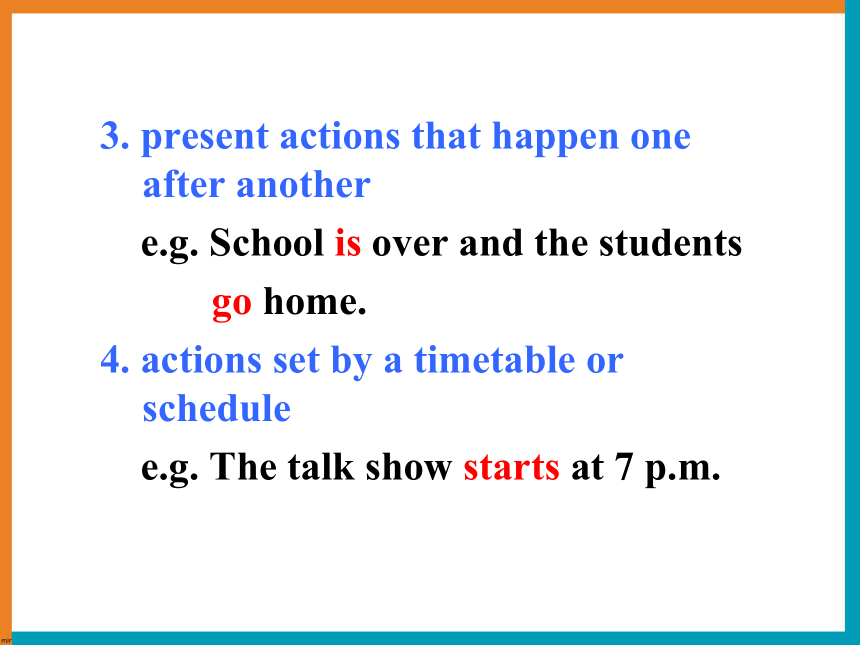
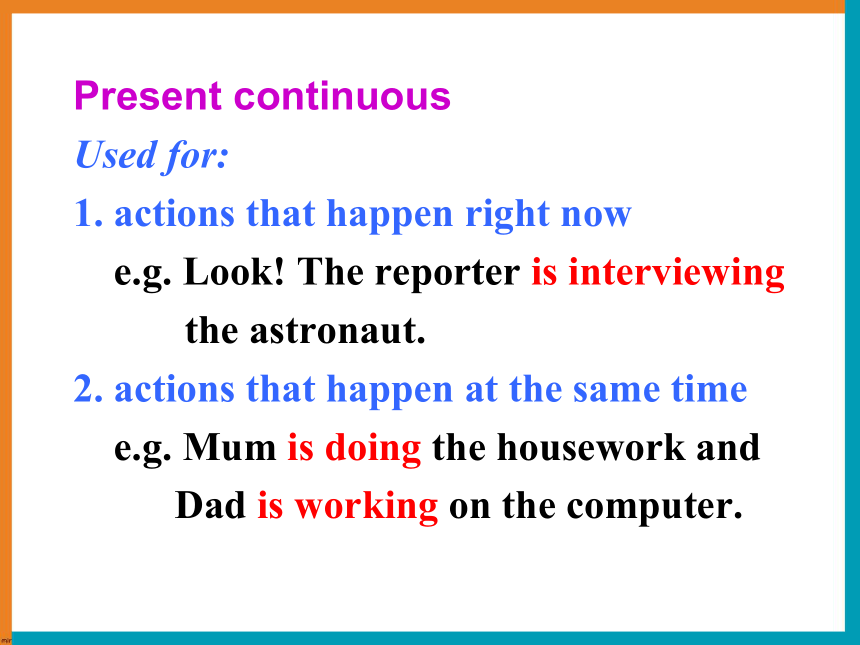
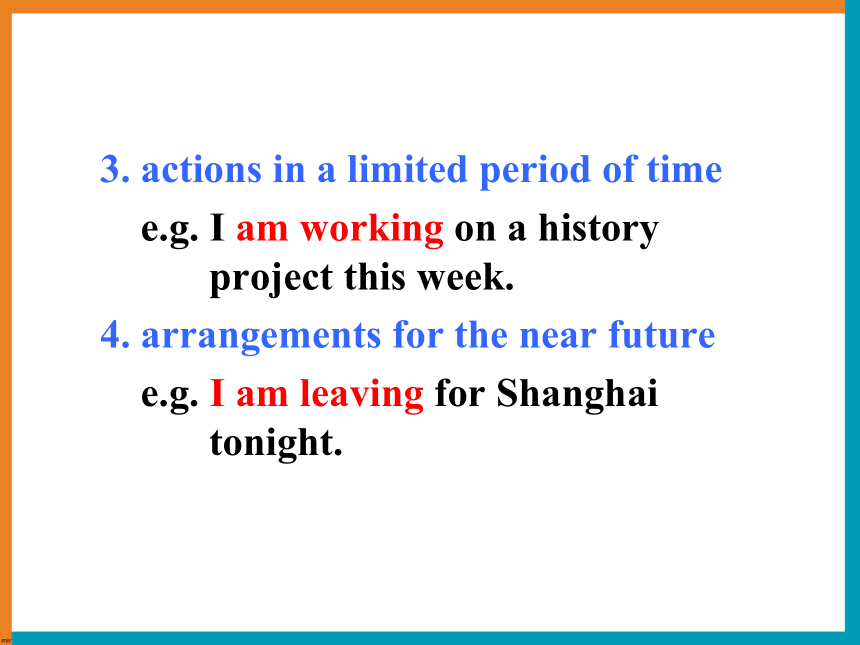
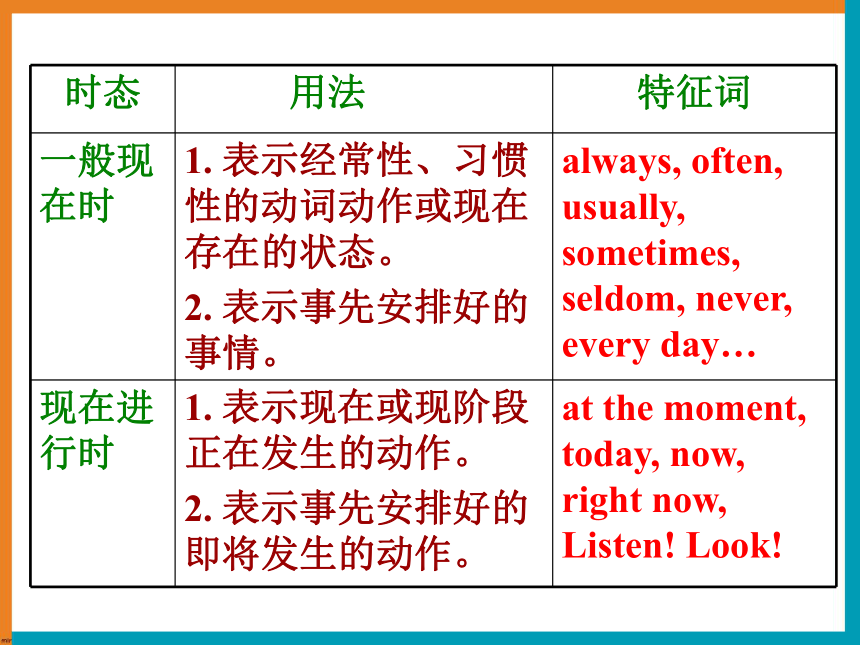
文档简介
课件34张PPT。Unit 2Unit 2
Great peopleGrammar
Revise six tensesStudying aims1. Revise the simple present tense, the present continuous tense, the simple past tense, the past continuous tense and the present perfect tense.
2. Sum up the differences between the simple past tense and the present perfect tense.
Translate the following sentences and tell what tense is used in each sentence.
1. 他总是设法独自做每一件事。
He always _________________________
____________. (时态:__________)
2. 宇航员们目前为下一次飞行做准备。
The astronauts ______________________
______ at present. (时态:___________) manages to do everything by himself一般现在时 are preparing for the next flight现在进行时Revision3. 在返回地球的途中,宇宙飞船开始旋转,失去了控制。
On their way back to the Earth, the spacecraft _________________________.
(时态:__________)
4. 那一刻,全世界都在等待着向他们问候。
At that moment, the whole world _______________________.
(时态:__________)began spinning out of control一般过去时was waiting to greet them过去时行时5. 在太空中,阿姆斯特朗接到缩短航程的命令。
In space, Armstrong __________________
________________. (时态:__________)
6. 因为他的出色表现,迄今他已经被授予了五个奖项。
Because of __________________, _____________________________ so far.
(时态:___________) received the order to cut the flight short一般过去时he has been presented five awards 现在完成时his excellent serviceSimple present
Used for:
1. a present state
e.g. John lives in New York.
2. daily routine and habits
e.g. I always go to bed at 140 p.m.Simple present and present continuous Task13. present actions that happen one after another
e.g. School is over and the students
go home.
4. actions set by a timetable or schedule
e.g. The talk show starts at 7 p.m.Present continuous
Used for:
1. actions that happen right now
e.g. Look! The reporter is interviewing
the astronaut.
2. actions that happen at the same time
e.g. Mum is doing the housework and
Dad is working on the computer.3. actions in a limited period of time
e.g. I am working on a history project this week.
4. arrangements for the near future
e.g. I am leaving for Shanghai tonight.e.g. I often go to school at 7 a.m.
我经常七点上学。
He is watching TV.
他正在看电视。
I like collecting stamps.
我喜欢集邮。
This month, they are preparing for the exam.
这个月他们正在准备考试。Millie is writing about what her family members are doing. Help her complete her article with the correct tenses of the verbs in brackets.We enjoy the modern life!Task 2I (1) _______ (have) a day out with my classmates this Saturday, so I (2) ____ (need) a pair of trainers. Mum (3) _________ (shop) online for me now. She often (4) _____ (shop) online. Dad (5) __________ (search) for information on the Internet. He (6) _______ (visit) Japan next week. Grandpa (7) ________ (read) the newspaper and Grandma (8) _________ (watch) TV. I (9) _____ (want) to write an email to Wendy before I (10) ____ (go) to bed.will haveneedis shoppingshopsis searchingwill visitis readingis watchingwantgoSimple past
Used for:
1. Actions that happened in the past.
e.g. Simon played football yesterday.
2. Actions that happened one after another in the past.
e.g. Simon came home, turned on the
computer and checked his email.Simple past and past continuousTask 3Past continuous
Used for:
1. actions that were in progress at a certain time in the past
e.g. Yesterday at 4 p.m., Simon was
playing football.
2. actions that happened at the same time in the past
e.g. Simon was playing computer games
while Millie was watching TV.3. actions that lasted for some time in the past
e.g. We were having a meeting from
9 a.m. to 11 a.m. yesterday.e.g.
Two months ago, I flew to London with my mother.
两个月前,我和妈妈一起坐飞机到伦敦。
She was reading while her mother was talking on the phone.
当她妈妈在打电话时,她在看书。
She was shopping at 10 a.m. yesterday.
昨天上午十点时她正在购物。Task 4
Simon and his friends are talking about what they did after dinner last night. Complete their conversation with the correct tenses of the verbs in brackets.Simon: I (1) ____________ (watch) a wonderful football match from 7 p.m. to 8:30 p.m. yesterday. My favorite team (2) _____ (win) the match.
Millie: I (3) __________ (write) an email to Wendy at 7 p.m. yesterday. She (4) ____ (send) me an email last week.
Sandy: I (5) _____________ (practise) playing the piano the whole night. I (6) ____ (take) part in a competition this morning. was watchingwonwas writingsentwas practisingtookPeter: Last night, I (7) ______ (find) a website about travelling in space. I (8) ___________ (read) passages on the website while you (9) ___________ (play) the piano, Sandy.
Daniel: I (10) __________ (talk) to Aunt Jane on the phone at 7:30 yesterday evening. She (11) ______ (call) me the day before yesterday, but I (12) _______ (be not) at home then. foundwas readingwere playing was talking calledwas notn. 章节,乐段Simple past
Used for:
1. actions that happened in the past
e.g. I bought a new bicycle yesterday.
2. actions that happened at a certain time in the past
e.g. Kitty wrote an email to Linda an
hour ago.Simple past and present perfectTask 5Present perfect
Used for:
1. emphasizing the result of a past action
e.g. I have bought a new bicycle, so I
can ride to school now.
2. telling how many times an action has happened till now
e.g. She has been to the USA twice.have
keep
be open
be on
be here
be there
be over
be dead
be in … / be a member of…
been married转换e.g. I lived in Sunshine Town three years ago.
(一般过去时不强调现在的情况)
我三年前住在阳光镇。
He has lived in Sunshine Town since he was born.
(表示他现在还住在阳光镇)
他自出生就生活在阳光镇。The film has started for over ten minutes. (误)
The film has been on for over ten minutes. (正)
(与for, since等表示从过去到现在的时间段连用时,肯定句中要用延续性动词)
电影已经开始十多分钟了。Millie is writing about some modern inventions that have changed the way we live. Help her choose the correct words in brackets to complete her article.Great inventionsTask 6Many modern inventions (1) __________ (make/ have made) a great difference in out life. They (2) ____________ (changed/ have changed) the way we live.
In ancient times, people (3) _____ (used/ have used) salt to help them keep fish or meat for a longer time. Fresh food would go bad in summer in a few hours. The invention of fridge (4) _________ (solved/ has solved) this problem. have madehave changedusedhas solvedIn the past, people (5) _______ (washed/ have washed) their clothes by hand. It (6) ____ (was/ has been) tiring, and it (7) _____ (took/ has taken) a lot of time. With the invention of the washing machine, people (8) _________ (had/ have had) more time to relax.
In the old days, people (9) ________ (travelled/ have travelled) by ship. Now planes (10) _________ (made/ have made) journeys more comfortable. washedwastookhave hadtravelledhave made手工Remember the use of the six tenses in this lesson.
Great peopleGrammar
Revise six tensesStudying aims1. Revise the simple present tense, the present continuous tense, the simple past tense, the past continuous tense and the present perfect tense.
2. Sum up the differences between the simple past tense and the present perfect tense.
Translate the following sentences and tell what tense is used in each sentence.
1. 他总是设法独自做每一件事。
He always _________________________
____________. (时态:__________)
2. 宇航员们目前为下一次飞行做准备。
The astronauts ______________________
______ at present. (时态:___________) manages to do everything by himself一般现在时 are preparing for the next flight现在进行时Revision3. 在返回地球的途中,宇宙飞船开始旋转,失去了控制。
On their way back to the Earth, the spacecraft _________________________.
(时态:__________)
4. 那一刻,全世界都在等待着向他们问候。
At that moment, the whole world _______________________.
(时态:__________)began spinning out of control一般过去时was waiting to greet them过去时行时5. 在太空中,阿姆斯特朗接到缩短航程的命令。
In space, Armstrong __________________
________________. (时态:__________)
6. 因为他的出色表现,迄今他已经被授予了五个奖项。
Because of __________________, _____________________________ so far.
(时态:___________) received the order to cut the flight short一般过去时he has been presented five awards 现在完成时his excellent serviceSimple present
Used for:
1. a present state
e.g. John lives in New York.
2. daily routine and habits
e.g. I always go to bed at 140 p.m.Simple present and present continuous Task13. present actions that happen one after another
e.g. School is over and the students
go home.
4. actions set by a timetable or schedule
e.g. The talk show starts at 7 p.m.Present continuous
Used for:
1. actions that happen right now
e.g. Look! The reporter is interviewing
the astronaut.
2. actions that happen at the same time
e.g. Mum is doing the housework and
Dad is working on the computer.3. actions in a limited period of time
e.g. I am working on a history project this week.
4. arrangements for the near future
e.g. I am leaving for Shanghai tonight.e.g. I often go to school at 7 a.m.
我经常七点上学。
He is watching TV.
他正在看电视。
I like collecting stamps.
我喜欢集邮。
This month, they are preparing for the exam.
这个月他们正在准备考试。Millie is writing about what her family members are doing. Help her complete her article with the correct tenses of the verbs in brackets.We enjoy the modern life!Task 2I (1) _______ (have) a day out with my classmates this Saturday, so I (2) ____ (need) a pair of trainers. Mum (3) _________ (shop) online for me now. She often (4) _____ (shop) online. Dad (5) __________ (search) for information on the Internet. He (6) _______ (visit) Japan next week. Grandpa (7) ________ (read) the newspaper and Grandma (8) _________ (watch) TV. I (9) _____ (want) to write an email to Wendy before I (10) ____ (go) to bed.will haveneedis shoppingshopsis searchingwill visitis readingis watchingwantgoSimple past
Used for:
1. Actions that happened in the past.
e.g. Simon played football yesterday.
2. Actions that happened one after another in the past.
e.g. Simon came home, turned on the
computer and checked his email.Simple past and past continuousTask 3Past continuous
Used for:
1. actions that were in progress at a certain time in the past
e.g. Yesterday at 4 p.m., Simon was
playing football.
2. actions that happened at the same time in the past
e.g. Simon was playing computer games
while Millie was watching TV.3. actions that lasted for some time in the past
e.g. We were having a meeting from
9 a.m. to 11 a.m. yesterday.e.g.
Two months ago, I flew to London with my mother.
两个月前,我和妈妈一起坐飞机到伦敦。
She was reading while her mother was talking on the phone.
当她妈妈在打电话时,她在看书。
She was shopping at 10 a.m. yesterday.
昨天上午十点时她正在购物。Task 4
Simon and his friends are talking about what they did after dinner last night. Complete their conversation with the correct tenses of the verbs in brackets.Simon: I (1) ____________ (watch) a wonderful football match from 7 p.m. to 8:30 p.m. yesterday. My favorite team (2) _____ (win) the match.
Millie: I (3) __________ (write) an email to Wendy at 7 p.m. yesterday. She (4) ____ (send) me an email last week.
Sandy: I (5) _____________ (practise) playing the piano the whole night. I (6) ____ (take) part in a competition this morning. was watchingwonwas writingsentwas practisingtookPeter: Last night, I (7) ______ (find) a website about travelling in space. I (8) ___________ (read) passages on the website while you (9) ___________ (play) the piano, Sandy.
Daniel: I (10) __________ (talk) to Aunt Jane on the phone at 7:30 yesterday evening. She (11) ______ (call) me the day before yesterday, but I (12) _______ (be not) at home then. foundwas readingwere playing was talking calledwas notn. 章节,乐段Simple past
Used for:
1. actions that happened in the past
e.g. I bought a new bicycle yesterday.
2. actions that happened at a certain time in the past
e.g. Kitty wrote an email to Linda an
hour ago.Simple past and present perfectTask 5Present perfect
Used for:
1. emphasizing the result of a past action
e.g. I have bought a new bicycle, so I
can ride to school now.
2. telling how many times an action has happened till now
e.g. She has been to the USA twice.have
keep
be open
be on
be here
be there
be over
be dead
be in … / be a member of…
been married转换e.g. I lived in Sunshine Town three years ago.
(一般过去时不强调现在的情况)
我三年前住在阳光镇。
He has lived in Sunshine Town since he was born.
(表示他现在还住在阳光镇)
他自出生就生活在阳光镇。The film has started for over ten minutes. (误)
The film has been on for over ten minutes. (正)
(与for, since等表示从过去到现在的时间段连用时,肯定句中要用延续性动词)
电影已经开始十多分钟了。Millie is writing about some modern inventions that have changed the way we live. Help her choose the correct words in brackets to complete her article.Great inventionsTask 6Many modern inventions (1) __________ (make/ have made) a great difference in out life. They (2) ____________ (changed/ have changed) the way we live.
In ancient times, people (3) _____ (used/ have used) salt to help them keep fish or meat for a longer time. Fresh food would go bad in summer in a few hours. The invention of fridge (4) _________ (solved/ has solved) this problem. have madehave changedusedhas solvedIn the past, people (5) _______ (washed/ have washed) their clothes by hand. It (6) ____ (was/ has been) tiring, and it (7) _____ (took/ has taken) a lot of time. With the invention of the washing machine, people (8) _________ (had/ have had) more time to relax.
In the old days, people (9) ________ (travelled/ have travelled) by ship. Now planes (10) _________ (made/ have made) journeys more comfortable. washedwastookhave hadtravelledhave made手工Remember the use of the six tenses in this lesson.
